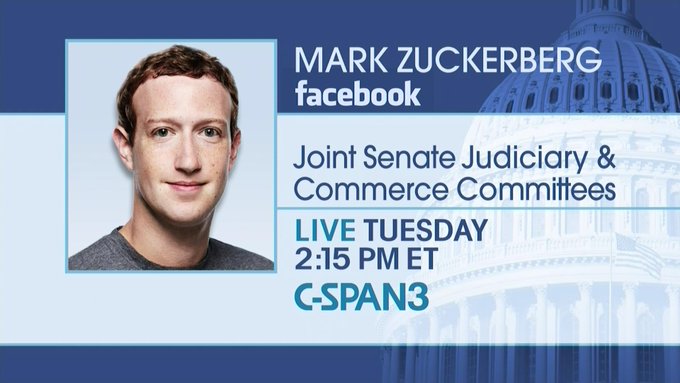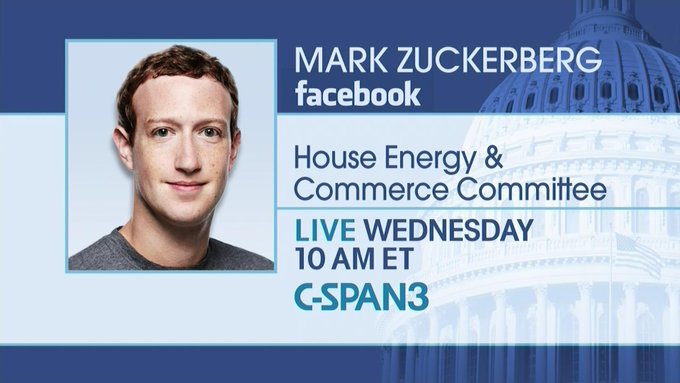In the News
By Luis Gomez
Facebook CEO Mark Zuckerberg is set to appear before three Congressional committees this week, starting Tuesday, to answer questions about how the social media giant collects and analyzes data from millions of its users.
Zuckerberg’s testimony, which will be broadcast live on television (and online, too), has attracted a lot of interest and attention because in March, it was revealed that the third-party political firm Cambridge Analytica tied to Donald Trump’s 2016 presidential campaign improperly collected profile data of up to 87 million users.
The scandal shook confidence in Facebook, leading some people to go as far as abandoning the social media site altogether — a revolt pronounced under the hashtag #DeleteFacebook. Big names like Apple co-founder Steve Wozniak, pop singer Cher and others have publicly quit Facebook. Tesla CEO Elon Musk deleted the Facebook Pages for his two big companies, including Space X.
On March 21, Zuckerberg apologized for missteps that led to the scandal. Now, the 33-year-old CEO is set to appear before Congress to offer some answers to questions from lawmakers, including Rep. Scott Peters, D-San Diego, who sits on the House Energy and Commerce Committee.
Mark Zuckerberg’s testimony on Tuesday, April 10
Zuckerberg is set to appear in a joint hearing with two Senate committees — the judiciary and the commerce, science and transportation committees — on Tuesday at 11:15 a.m. Pacific Time (2:15 p.m. Eastern Time).
That testimony will be broadcast live via C-SPAN.
Mark Zuckerberg’s testimony on Wednesday, April 11
Zuckerberg will return to Congress the next day to testify before the House Energy and Commerce Committee on Wednesday at 7 a.m. Pacific Time (10 a.m. Eastern Time).
That testimony will also be broadcast live on C-SPAN.
What Zuckerberg is expected to tell Congress
Lawmakers are expected to press the Facebook CEO for answers on what the company has done to protect the privacy of the billions of its users and whether it has done enough to prevent misuse of data to influence elections. Some worry Facebook could be used to influence the 2018 midterm elections.
On Monday, Facebook released prepared remarks Zuckerberg is expected to give at Wednesday’s hearing. In it, he is expected to discuss what exactly happened with Cambridge Analytica, Russian interference in the 2016 U.S. election and what his company plans to do to protect users’ data from being used for election meddling.
“It’s clear now that we didn’t do enough to prevent these tools from being used for harm as well. That goes for fake news, foreign interference in elections and hate speech, as well as developers and data privacy,” Zuckerberg’s statement reads. “It was my mistake, and I’m sorry. I started Facebook, I run it, and I’m responsible for what happens here.”
What lawmakers are saying ahead of the hearings
In an interview with The San Diego Union-Tribune, Rep. Scott Peters said that Zuckerberg needs to prove it can keep user’s information private or otherwise have Congress pass laws to ensure those protections.
“They can come up with a solution to this which is technically sound and is fair to people and their privacy or the government has to step in, which would be a shame,” Peters told the Union-Tribune on Monday.
“I am very concerned about this breach of privacy and it’s unacceptable,” Peters added. “And it's not the first time that this company has done something like this without going on an apology tour without showing that their values are to protect their customers.”
Rep. Frank Pallone, D-New Jersey, who is a ranking member of the House Energy and Commerce Committee, chided Facebook last week over a potentially larger problem affecting the social network’s 2 billion users.
Another Democrat in the House Energy and Commerce Committee, Rep. Bobby Rush, D-Illinois, said he wants to know how Facebook will apply Europe’s more stringent privacy standards but in the U.S. Europe’s General Data Protection Regulation goes into effect May 25 and they set rigorous standards for how internet companies collect and store user data of Europeans.
The U.S. has no similar law pushing for the same kind of protections for Americans, but Rep. Rush said last week he wants to know specifically which aspects of the European law Facebook “will and will not be implemented for users in the United States and around the world.”
Facebook also faces lawsuits
Troubles for Facebook don’t end with Congress. The company is also facing several lawsuits over the Cambridge Analytica scandal. Here’s a brief list of who is suing Facebook:
Cook County in Illinois is suing Facebook for allegedly violating state law and failing to protect the privacy of its users. The county is also suing Cambridge Analytica for allegedly violating the Illinois Consumer Fraud and Deceptive Business Practices Act, the Chicago Tribune reported.
Facebook investors are suing the company accusing it of making “false and misleading statements” about its policies, and for allegedly misleading investors when it said that it had not disclosed data to third-parties, CNN reported.
Individuals like San Diego-based Navy veteran and others have joined a class-action lawsuit against Facebook alleging that the company failed to protect personal information of its users, The San Diego Union-Tribune reported.

